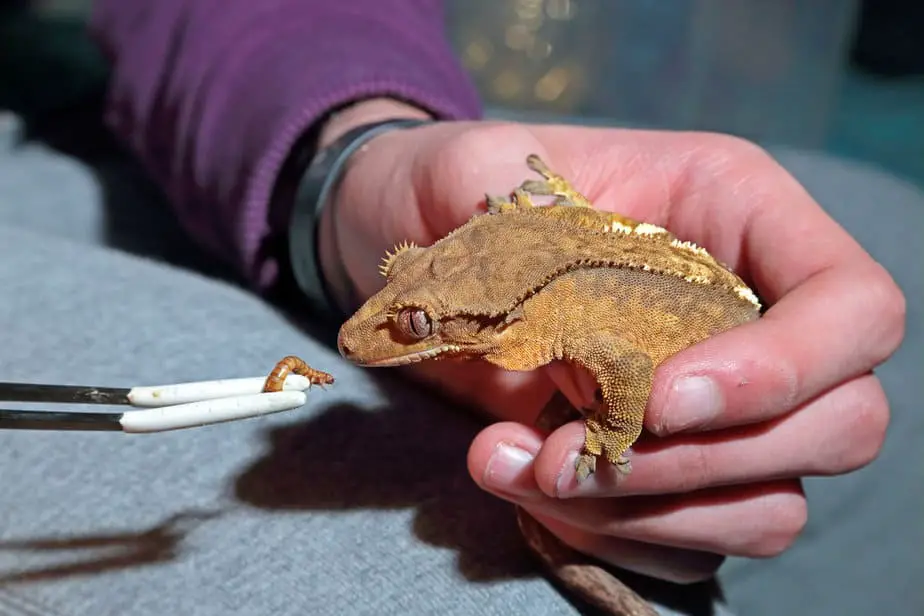Handling a crested gecko requires care and understanding. This article provides essential tips for gentle and safe interaction. Learn the best practices to ensure your gecko’s well-being and comfort during handling.

The Basics of Crested Gecko Handling
Crested geckos are generally easy to handle, but following proper guidelines is essential to ensure their well-being. Patience and consistency are key when introducing handling sessions.
Keep in mind that:
- A newly arrived gecko needs at least 2 weeks to acclimate before handling.
- Baby cresties should not be handled.
Handling Frequency and Duration
Here are some recommendations for handling sessions:
- 1-2 times a week, mainly for cage cleaning during the first month.
- 2-3 times a week, 15-20 minutes per session afterward.
- Individual needs may vary; monitor your gecko’s stress level and adjust accordingly.
Factors to Consider
Consider the following elements for successful handling:
Age: Juveniles and adults can be handled more frequently, while babies should not be handled.
Personality: Some geckos may be more laid-back than others.
Stress: Monitor for signs of stress or discomfort during handling, such as rapid breathing or excessive squirming.
Handling Tips
Proper handling techniques can help provide a safe and enjoyable experience for both you and your gecko:
- Approach your gecko slowly and gently.
- Offer your hand as a platform for your gecko to climb onto.
- Keep your handling sessions low to the ground to prevent injury in case of a fall.
- Avoid handling your gecko during shedding; their skin may be sensitive.
Methods for Handling Crested Geckos
Proper Picking Up
To safely pick up a crested gecko, follow these steps:
- Wash your hands with unscented soap to prevent transferring harmful chemicals or oils.
- Open the tank slowly and gently place your hand or a branch near the gecko.
- Allow the gecko to climb onto your hand or branch rather than grabbing or squeezing them.
It’s important to avoid grabbing their tail, as they may drop it in defense.
Interaction and Play
When interacting with your crested gecko, keep these guidelines in mind:
- Limit handling time to 15-20 minutes per day to minimize stress.
- Sit on the floor or hold the gecko over your bed to prevent injury from falls.
- Monitor their health and weight during handling by examining their body condition.
Remember to wait at least two weeks after bringing your gecko home before attempting any handling sessions.
| Age Group | Handling Frequency |
|---|---|
| Baby gecko (<10g) | Handle only when necessary |
| Juvenile gecko | Gradually increase handling |
| Adult gecko | Up to 15-20 minutes per day |
Releasing Techniques
When it’s time to put your crested gecko back into its enclosure, follow these tips:
- Lower your hand or branch near a familiar surface in the enclosure.
- Allow the gecko to climb off your hand or branch voluntarily.
- Gently nudge them if they are hesitant to move off of your hand.
By using these methods, you’ll ensure that your crested gecko remains comfortable and stress-free during handling sessions.
Common Mistakes and Mishandlings
Incorrect Holding
Crested geckos are delicate creatures. When handling them, remember these points:
- Avoid squeezing: They are prone to injury if squeezed too tightly.
- Support their body: Make sure to offer adequate support for their entire body.
- Use hand-walking technique: Place one hand in front of the other, allowing the gecko to walk from one hand to the other.
Excessive Handling
It is crucial to strike a balance between handling your gecko and giving them space. Consider the following:
- Limit handling sessions: Gradually extend handling sessions to a maximum of 15-20 minutes a day once your gecko is consistently calm.
- Respect their nocturnal nature: Crested Geckos are active during the night, so it’s best to align handling sessions with their natural rhythm.
- Avoid stressing the gecko: If you notice your gecko is flighty or stressed, refrain from excessive handling and give them some time to settle before attempting to handle again.
Health Impact of Improper Handling

Handling your crested gecko improperly can lead to various health issues. Being aware of these problems and taking the necessary precautions can help ensure your pet’s well-being and strengthen the bond between you and your gecko.
Impaction: This occurs when a gecko’s digestive tract becomes blocked due to:
- Consuming indigestible substrate
- Consuming oversized prey items
Signs of impaction include:
- Loss of appetite
- Constipation
- Swelling of the abdomen
Prevention techniques:
- Use appropriate substrates
- Offer prey items of suitable size
Stress: Overhandling can cause stress-related health problems. Maintain a balance between interaction and allowing your gecko to rest.
Signs of stress include:
- Tail twitching or bobbing
- Hiding or avoiding contact
- Irregular breathing
Handling baby crested geckos: Your gecko should weigh between 8-15 grams before you begin handling it. Baby geckos are delicate and get scared easily, leading to possible injury if you attempt to handle them too soon.
Understanding these impacts will help you handle your crested gecko in a way that ensures their well-being and reduces the risk of health issues.
More Tips for Safe and Effective Handling

Before handling your crested gecko, keep these tips in mind to ensure their safety and comfort:
- Wash your hands: Use unscented soap to prevent transmitting harmful chemicals or oils.
- Open the tank slowly: Offer your hand or a branch for the gecko to climb on.
Once your crested gecko is out of its enclosure, follow these guidelines:
- Sit on the floor or hold them over your bed: This reduces the risk of injury if they leap or fall.
- Don’t grab, squeeze, or hold them by the tail: Such actions can cause stress or injury to your gecko.
- Monitor their health and weight during handling: Use this time to check for any potential health issues.
Consider these handling recommendations based on your crested gecko’s size:
- Baby geckos (<10 grams): Refrain from handling, as they are more skittish and prone to injury.
- Adult and juvenile geckos: Gradually increase handling time, aiming for no more than 15-20 minutes per session.
Here’s a table to summarize handling tips for crested geckos of different sizes:
| Gecko Size | Handling Recommendation |
|---|---|
| Baby | Avoid, handle only if necessary |
| Adult & Juvenile | Gradually increase, up to 15-20 minutes per session |
Remember to keep handling sessions brief to minimize stress, and always monitor their behavior to ensure they are adapting well. With these tips, your crested gecko should become more comfortable and used to your presence over time.
